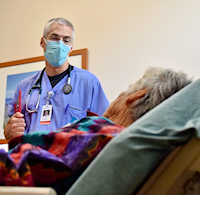“Invisible Patients” and the COVID Pandemic

With thanks to advocate and guest blogger, Karen Leitson.
Find Karen’s advocacy profile here: Personalized Healthcare Advocate
Do you or does someone in your family have an unattended medical condition or illness that might be taking a back seat to the coronavirus public health crisis?
There is never a “good time” to be sick or to have an ill family member, loved one or friend. But now, during this period of the Covid-19 pandemic, is a particularly difficult time to be in the crux of an illness or even to have medical questions or concerns. How can you and your family get the best care during this time when health care providers and services are so overburdened?
Thousands of people with non-Covid-related illnesses are not seeking nor receiving the medical care they need. In many ways this is understandable. Here are some reasons why you or someone you love may be reluctant to seek medical care now:
- You may be afraid to enter a doctor’s office, urgent care center or hospital for fear of exposure to coronavirus;
- You may be fearful of being refused treatment;
- You may worry that your care will be inadequate because the staff is overwhelmed by Covid;
- You may not want to contribute to draining an already over-burdened healthcare system; or,
- You may be too anxious to go to a medical facility when you aren’t allowed to bring a family member, companion or advocate with you.
A recent article in a prominent medical journal referred to people who are sick but do not have Covid as “invisible patients.” Routine check-ups as well as surgery and procedures for serious conditions are all too often postponed. The American Heart Association reports that 911 calls for heart attacks and strokes are significantly reduced from their pre-Covid numbers.
What can you do to get the medical care you need and deserve?
First, acknowledge that you need and should get medical care. You are not taking something from someone else by avoiding your own care. In fact, if you ignore your own or your loved one’s needs, you or your loved one may get sicker and need more care, thus further taxing a medical system under great stress.
Next, make that call. Speak up, contact your doctor and make an appointment or speak to an office nurse or medical assistant. You may need to negotiate a care plan or procedure timeline, but you should and can get medical care. Your doctor’s office might schedule a video or “telemed” appointment. If a video chat is unfamiliar to you, your doctor’s office will talk you through the steps. If you prefer a voice call or don’t have a computer or the required computer programs, say so! You are not required to own a computer or be a skilled computer user to get medical care.
 If your symptoms require a trip to the emergency department, go! The reality is that many hospitals have created non-Covid emergency departments that are now underutilized. A large midwestern hospital set up a non-Covid emergency department, complete with wall separators and medical providers wearing gowns and masks to protect patients. This facility as well as many other non-Covid emergency departments are largely empty these days. So, don’t hesitate to seek care at an emergency department.
If your symptoms require a trip to the emergency department, go! The reality is that many hospitals have created non-Covid emergency departments that are now underutilized. A large midwestern hospital set up a non-Covid emergency department, complete with wall separators and medical providers wearing gowns and masks to protect patients. This facility as well as many other non-Covid emergency departments are largely empty these days. So, don’t hesitate to seek care at an emergency department.
If you feel overwhelmed and could use some assistance, then find a patient advocate to help you get the care you need. What can patient advocates do? Patient advocates know how to navigate health care systems. A patient advocate can help you think about which treatments and care plans can wait until the Covid pandemic subsides and which ones cannot and should not be postponed.
Patient advocates know which questions to ask and to whom they should be addressed. Advocates know how to help their clients think through complicated and complex medical questions and options. They can help prioritize concerns and requests for care as well as help you think about which medical situations might wait and which cannot and should not be delayed. Patient advocates can liaison between you, your family and your doctors. An advocate can enhance communication with your doctor while being of service to overworked physicians.
Take care of yourself and your family’s health and stay safe!!
And, get help when you need it.
Find a Health / Patient Advocate or Care Manager
Learn more about The Alliance of Professional Health Advocates
